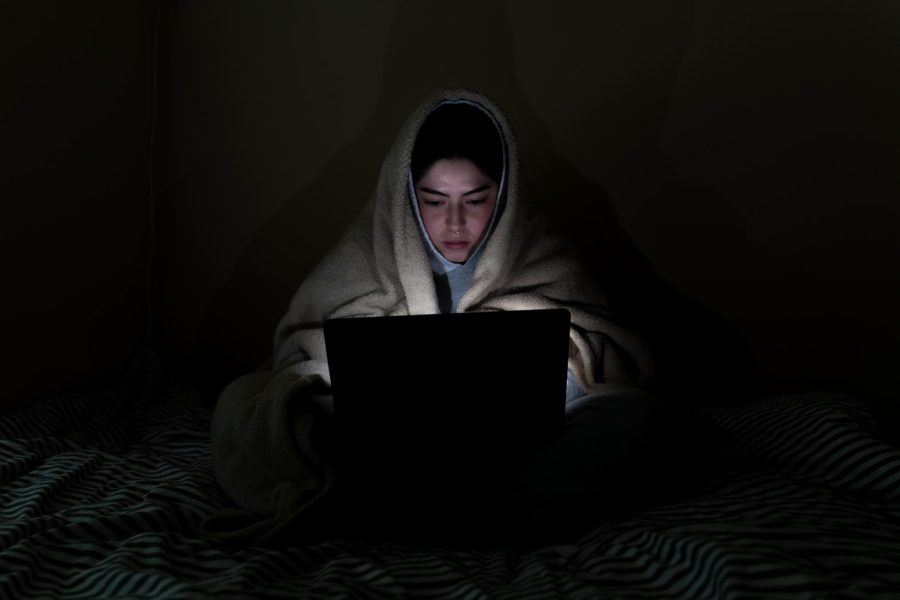- Beavers Digest
- Beavers Digest / Culture
- Beavers Digest / Culture / People
- Beavers Digest / Entertainment
- Beavers Digest / Entertainment / Media
- Beavers Digest / Experience
- Beavers Digest / Experience / Wellness
“Easy to get sucked in and lose track of time:” How to pace your YouTube consumption
By Ridwana Rahman, OMN Photographer
OSU senior Gabriela Velazquez stays up watching Youtube, on April 26 in Corvallis, Ore., even on a school night.
June 16, 2022
Editor’s Note: This article does not contain professional advice from a health expert on YouTube overconsumption. If you have serious concerns, please consult a medical professional. Oregon State University’s Counseling and Psychological Services and Student Health Services are both reliable on-campus options for students seeking advice on unhealthy media consumption.
Do you enjoy watching YouTube videos almost every day, so much so that it has become one of your hobbies? Can you live without it? Here are a few things you should know about YouTube overconsumption—what it is and what you can do about it.
YouTube continues to grow and garner attention every year. It has become a viable media tool that helps users do a variety of things—advocate for self-love and support fellow content creators, among other things. However, some of us may not realize that constantly watching Youtube videos has become part of our daily habits and lifestyle, especially in our free time.
“Videos from YouTubers I subscribe to tend to make up about 75% of all videos I watch, though lately, I have been watching more of older videos rather than recent releases,” said Trevor Gearin, a third-year student studying business administration and computer science at Oregon State University.
When describing his dependence on YouTube, Gearin said it’s complicated—he doesn’t think he is necessarily reliant on YouTube. He knows his day would continue as normal without it, but it’s what he likes to watch most of the time when he is relaxing or wants some mindless background noise.
“I would say it’s pretty important—not so much for the daily silly content, but occasionally I do use it for instructional videos or to learn something new and those opportunities are pretty valuable,” Gearin said.
For studying purposes, Gearin thinks YouTube is moderately important. He said most of the time he can understand what he is learning fairly easily, but instructional videos have been a huge help for certain concepts or mathematics.
“I know what I’m watching most of the time has little to no bearing on my well-being or relevancy in my life, but I get caught up in just watching and watching,” Gearin said. “It’s kind of like how people might automatically pull up social media the first time they look at their phone in the morning. The first thing I do when I get home, usually without thinking, is open up Youtube and see if I have any new video notifications.”
In addition, Gearin said routinely watching YouTube videos has likely impacted his mental health.
“It’s easy to get sucked in and lose track of time. Suddenly having eight hours of sleep turns into six because of just mindlessly scrolling through different videos,” Gearin said.
Gearin said he pays for YouTube premium and uses ad blockers, making it difficult for him to determine whether YouTube tracks his everyday activities, but he said he would not be surprised if they do.
“I think if I physically blocked YouTube from being accessible in my house, there would be a day or two where I’d click to it automatically, realize it’s not accessible, shrug and move on with my day,” Gearin said. “Its addictive nature comes from being able to use it, but I’ve gone more than a few days without it when I’m out of town or on a vacation.”
Since he has been watching YouTube since 2010, Gearin thinks it’s mostly just a habit. He said the only two channels he actively follows anymore are “Markiplier” and “Jackscepticeye” because he has watched their content for so long and loves to see when they try something new.
“I occasionally eat while watching YouTube content,” Gearin said. “But usually, I put it on in the background if I’m doing chores like cleaning or cooking. It’s rare that I sit and just focus on it unless there’s something really special on like a charity livestream.”
Gearin said he does not consider himself addicted to Youtube, though he said the platform definitely has an addictive feeling to it and thinks the algorithm is recently very focused on keeping that attention once you show up on the site.
“It’s so habitual at this point I think blocking the site at home would be my best bet, since I never really watch Youtube at school or away from home,” Gearin said.
Gearin said he is not really sure if YouTube gives him happiness.
“I’m high-functioning autistic, and I don’t know how much that plays into it, but once I’ve got something really ingrained as part of my routine it’s hard to get out of it,” Gearin said. “I think ‘Markiplier’s In Space’ series that was just released has been the most interesting thing to happen on YouTube for quite a while. Most of what I watch is cheap laughs or craft videos that I find interesting… but I’m not sure if they really make me happy. It’s hard to really explain.”
According to a 2022 article by Kendra Cherry, a psychosocial rehabilitation specialist with expertise in psychology, personality and research, “YouTube addiction is not a distinct mental health condition, although some experts suggest that internet addiction should be recognized as a disorder in the DSM-5, the manual that healthcare professionals use to diagnose mental disorders.”
Since YouTube addiction is not a recognized condition, Cherry notes that there are no specific diagnostic criteria, though there may be some indicators that your video viewing is unhealthily excessive, such as:
- “Spending most of your time watching YouTube videos, thinking about videos or planning to watch videos
- Feeling like you have to watch online videos in order to feel good
- Continuing to watch YouTube videos even though the behavior leads to negative consequences
- Feeling like you can’t cut back on your viewing time even though you want to
- Neglecting important duties related to work, family, school or other life areas
- Hiding your YouTube viewing habits from other people
- Experiencing symptoms of withdrawal—such as feeling depressed, angry or irritable—when you try to stop watching YouTube”
“Even if your excessive YouTube use doesn’t qualify as an addiction, it might still create problems in your life. For example, it might cause disruptions in your life and your relationships. It might affect your performance and work,” Cherry said.
According to Daniel Faltesek, an associate professor in new media communications at OSU, the rhetoric of addiction is very heavy and entails a loss of agency by the supposed “addict.”
“Addiction rhetoric becomes a way for us to treat our choices as the result of seductive objects, the critique of which is part of a larger constellation of discourses about media anxiety,” Faltesek said. “Every new media technology is accompanied by fears that the technology will strip us of our free will and lead us astray. Of course, this will be the framing for every new technology—just as you write about YouTube addiction, a student in two years will write about TikTok addiction and two years after that surely some other brand name technology will be addicting the youth.”
Faltesek said any media can be problematic, including books.
“In terms of documented use behaviors, political YouTube research has confirmed that 80% of YouTube viewing sessions have a length of one, and 55% of videos watched are in groups of four or less,” Faltesek said, citing a 2021 study published in the Proceedings of the National Academy of Sciences of the U.S.A. “This complicates the broad addiction narrative. Right now, I am one of those users ‘watching’ many videos as I truly enjoy the music from vintage recordings of The Weather Channel. My use case strongly aligns with off-line factors related to my preferences, not addiction.”
Faltesek explained that the danger of YouTube is not addiction but how the company tries to keep people engaged.
“The YouTube recommendation system will provide a never-ending flow of increasingly extreme suggestions to keep users engaged,” Faltesek said. “Exposure to bursts of radical content can predict future radical content engagement. It is possible that this is not the result of the recommendation system but of users who have decided to engage in toxic content.”
Through therapy, Cherry said you can also develop new coping skills that will help you break your YouTube habit. Therapy can also help treat any other underlying mental health concerns that might be contributing to your behavior.
In addition to seeking professional treatment, Cherry recommends taking some steps on your own to reduce YouTube intake:
- “Setting limits on when you can watch YouTube: Sometimes trying to completely eliminate something you enjoy can make you want it even more. To avoid this, give yourself a specific amount of time each day to watch YouTube videos.
- Turning off autoplay: Access the settings on your YouTube account and toggle off the “Autoplay next video.” Eliminating the constant feed of automated videos may make it easier for you to stop viewing when you planned.
- Setting a reminder to take a break: Again, access YouTube settings and toggle the “Remind me to take a break” option. You can set this to whatever time period you have decided to allow for video-watching.
- Turning it into a reward: You might also consider allowing yourself to watch videos for a period of time as a reward for completing certain tasks. For example, you might tell yourself that you can watch videos for 15 minutes after you finish cleaning up the kitchen. Or you might give yourself permission to watch for 30 minutes after you finish working for the day.
- Use distractions: Finding something else to fill your time can also help when you are tempted to spend hours immersed in online videos. Distractions that might help include watching tv, reading a book, pursuing a hobby you enjoy, exercising, or visiting with a friend.”
“The question students should ask themselves about YouTube: Is this the kind of content I really like? Why am I watching this content? Am I sure I want to take in a burst of this? If you don’t like your answers to these questions, head down to the bowling alley at the MU or at least switch to Hulu,” Faltesek said.






